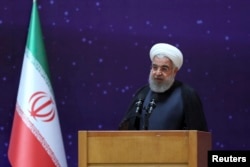Nations attending a U.N. conference on the Nuclear Non-Proliferation Treaty warn the threat of nuclear weapons use is growing and efforts toward the elimination of such arsenals must be re-doubled.
The Nuclear Non-Proliferation Treaty, which came into force nearly 50 years ago, has successfully prevented the widespread development of these weapons of mass destruction. But many nations worry global insecurity is eroding international commitments to disarmament.
At the opening session of the NPT conference, the United States singled out North Korea and Iran as two of the greatest threats facing the non-proliferation regime. The assistant secretary of state for international security and nonproliferation, Christopher Ford, noted that North Korea withdrew from the NPT after being caught violating the agreement's terms. He said that while the North continued to violate legally-binding U.N. Security Council resolutions, the nonproliferation regime faced a real, but longer-term challenge from Iran.
“A country that for years unlawfully and secretly sought to develop nuclear weapons, suspended its weaponization work only when confronted by potentially dire consequences, continued to enrich uranium in violation of U.N. Security Council requirements, and retains the ability to position itself, several years hence, dangerously close to rapid weaponization,” Ford said.
The Trump administration will decide by May 12 whether it will continue to participate in the Iranian Joint Comprehensive Plan of Action, a deal that was negotiated by the five nuclear powers and the European Union.
The special European envoy for disarmament and non-proliferation, Jacek Bylica, spoke on behalf of the European Union, which he says remains committed to the Iranian deal and expects all parties to implement it in full.
“It is in our common interest to preserve a deal that strengthens the global non-proliferation regime, contributes positively to reach international peace and security and provides the international community with necessary assurances on the exclusively peaceful nature of Iran's nuclear program,” Bylica said.
The EU envoy received strong support from the International Atomic Energy Agency, which has been monitoring Iran’s nuclear program since 2016. It said Iran was subject to the world’s most robust nuclear verification regime and was in compliance with its commitments under the JCPA.








